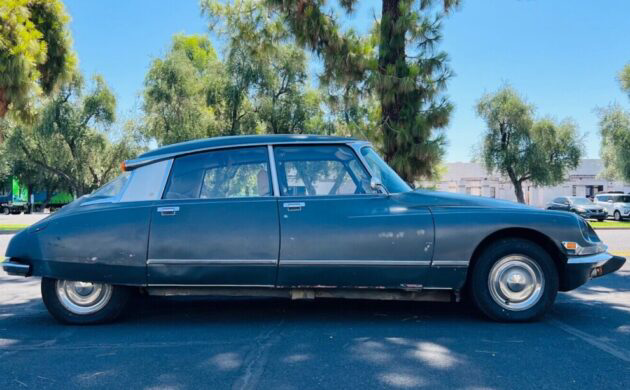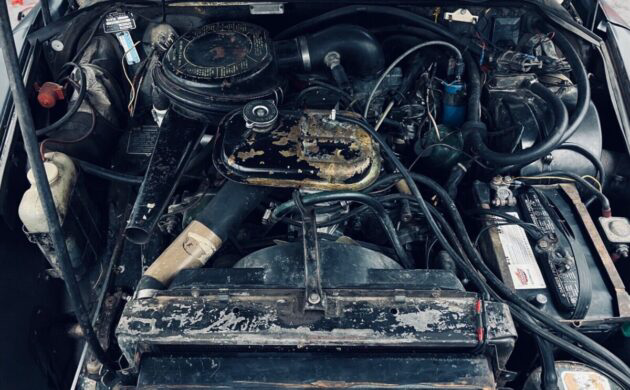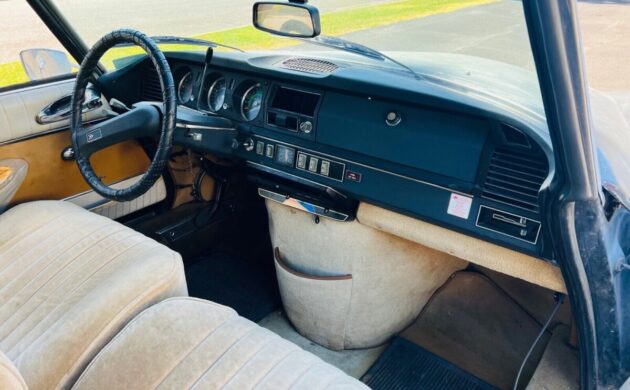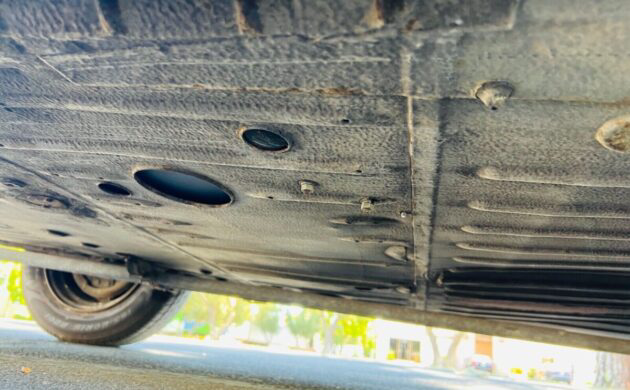No Reserve: 1972 Citroen DS21 Pallas
Citroen’s ID and DS models, introduced in 1955, swept the automotive world like a hurricane. Accolades rained down on the car for its styling, innovative suspension, directional headlights, and other features. Many years after the last car moved down the assembly line in 1975, the DS was receiving awards for “most beautiful” and “most influential” car of all time. These cars are not rare, with over 1.4 million copies plying the streets at one time or another. A subset of these was slewing around international rally courses, to good effect, particularly in Monte Carlo where both the DS and the ID won a few times. Here on eBay is a 1972 Citroen DS21 Pallas for sale, bid to $7,000 with no reserve. This car is located in Phoenix, Arizona.
The engine is a 2175 cc four-cylinder, and in 1972 it was offered either with a carburetor or – for more power – fuel injection. This car is carburetted and should generate just north of 100 bhp. The seller says the car is in driving condition and is used on weekends, but he admits it is still a project. All of the Citroen line-up was underpowered, which was fine in Europe but made the car less desirable in America. In its home country, the DS was a luxury car; here, not so much. In an era of air conditioning, high horsepower ratings, and luxe interiors, the DS didn’t measure up. Still, these cars have gained significant favor in recent years as collectors increasingly appreciate their quirkiness.
Citroen designated the “Pallas” as a luxury version, with either better quality cloth or leather interior and a few bits of special exterior trim. This photo shows the distinctive single-spoke steering wheel that all these models shared. The headliner could use replacement, but the dash is crack-free and the cloth looks great. This car has a Citromatic semi-automatic transmission, which is basically a gear shift without the clutch. There’s a small learning curve associated with changing gears successfully in a Citromatic car, and you need to remember there is NO “Park” gear. More than one newbie Citroen owner has forgotten that critical fact, the practical result of which is: keep your parking brake working!
This car is dry and rust-free underneath, and the seller indicates that body rust is minimal. The all-important hydraulics for the hydropneumatic suspension are working well. This no-reserve car has lots of potential, and it’s doubly appealing since it can be driven while you work on its restoration.
Auctions Ending Soon
 2002 Subaru Impreza WRXBid Now1 days$333
2002 Subaru Impreza WRXBid Now1 days$333
 1975 Chevrolet Corvette ConvertibleBid Now1 days$4,000
1975 Chevrolet Corvette ConvertibleBid Now1 days$4,000
 1964 Ford F-100 Camper CustomBid Now1 days$2,000
1964 Ford F-100 Camper CustomBid Now1 days$2,000
 2006 Jeep Wrangler SportBid Now3 days$11,000
2006 Jeep Wrangler SportBid Now3 days$11,000
 1974 Datsun 260ZBid Now5 days$750
1974 Datsun 260ZBid Now5 days$750





Comments
I have to say the DS might not have measured up to other luxury cars when parked, but once you drove or rode in one, the equation changed dramatically. No other car I know of, no matter how much fancier or more costly, could come near matching its ride and, thanks in large part to its smooth, aerodynamic shape, the underpowered DS could cruise all day in a relaxed manner at extra-legal speeds.
It certainly wasn’t a car for everyone. Service and parts weren’t easy to come by, and still aren’t. Most problematic was the hydraulic system: when it failed, so did the steering, suspension, brakes, and shifter. My own very-used DS suffered from leaks which were the devil to trace, but the hydraulic pump, regulator and the various pressurized “spheres” never failed me.
I would say the “quirky” factor drew me to check one out, and the car’s general demeanor made me write the check. I’d love to do it again.
I will own one when the time is right. These cars are so cool and innovative. Love the shape and the quirkiness. I can’t wait to get the 88 CX GTI I purchased in April. I’m just so busy with customer work the poor little Citroen is languishing and looking at me in that tone of voice! I hope to post updates once work commences.
Citroens’re fine once you get your head around them.
I only ever saw one Citroen in person: It belonged to the custodian at the elementary school I attended back in the late 1960’s. Interestingly, my sixth-grade teacher had a brand new ’68 Corvair Monza.
These are simply beautiful in every way save one. The uni-stalk steering wheel. It’s time to stop calling cars like this “underpowered.” Instead we should call the American counterparts “grossly overpowered.”
I have often wondered why Americans feel the need for 200 to 800 hp engines to power their cars. The speed limit is still 70 mph in America as far as I know and virtually ANY modern car can do over 100 mph if required. Nobody needs to get from 0-60 in three seconds when fifteen seconds is fast enough for anybody apart from boy racers.
In South Dakota the current speed limit on both I-29 and I-90 is 80 mph. I’ll be driving on I-29 tomorrow heading to Sioux Falls, 45 miles away. I will NOT exceed 70. IMHO, 80 is much too fast as people normally drive 5-7 mph over the limit. I guess it’s acceptable ‘west river’, west of the mighty Mo as it’s a pretty boring drive from Chamberlain to Rapid City, with the exception being the occasional Badlands type terrain on the south side. I’d love to own a Citroen, especially a 2-CV.
I owned an early 70’s D Special (bare bones Citroen). One of the nicest driving cars I have ever owned. The ride was hard to believe. Relatively deep snow was not a problem as the hydraulic suspension system allowed the car to be raised to ride above the accumulation. In 1976 I built our house and needed a truck. It was easy to remove the back seat. I was able to make a run to the local lumber supply and loaded 88 precut 2×4’s in it one day. When the house was complete I put the rear seat back in and drove it for a couple more years before the clutch failed.
Beautiful looking car. It’s a felony that such cars weren’t sold in large numbers here in the USA. With the right service network to keep them on the road, I imagine they could’ve done well here.
The comment about underpowered doesn’t fit well especially when
we do a simple math:
This use 2.1L with 103hp (measured with DIN-Norm, to say power
on the tires) so an average ‘muscle car’ of this era with a 366 or
383 with eight pots makes 300hp. (In SAE as used back in time
what would be in DIN is probably about 240hp)
Whilst the French uses a 4 cylinder with better gas mileage its
competitor in this table uses a V8 and energy hungry automatic
transmission and gas hungry aircon compressor.
The French has a weight of 1150 KG and the other have up from
1660 KG, the oldCit has a rate to weight 0,09 PS/kg and
the ‘muscle car’ have 0,14 PS/kg